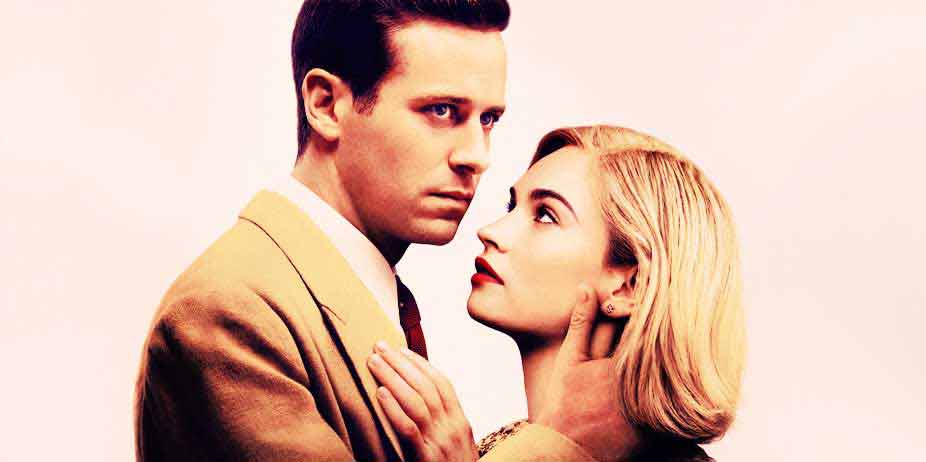
Rebecca (2020)
Last night, I dreamed I went to Manderley again… may be one of the most famous opening lines in literary history. It’s the first person narrative style of the nameless, faceless heroine in a novel who feels utterly overshadowed by the absent “first wife” of her husband, Max de Winter. Though given several on-screen treatments, from the famous Hitchcock version in the 1940s (and forced to alter a plot twist in its script to pass the moral censor board of the time) to the memorable adaptation with Charles Dance, this is the first time a full-length film has altered plot points and the climax for a more exciting tale. It works, and it doesn’t.
Our fresh-faced young heroine (Lily James) is in Monte Carlo at the behest of her annoying American employer. Paid well but not treated well, she first meets the famous widowed Max de Winter (Armie Hammer), considered a catch by every female in the hotel, in the dining room when she tries to inconspicuously get him seated at her employer’s table. When said woman comes down with a cold, she finds her days free—and to her surprise, Max soon fills them with long drives, picnics on the beach, and walks up the coast. Mysterious and handsome, it doesn’t take much to win over her heart. But her employer recovers, gets wind of this little “gold digging romance,” and threatens to whisk her away to New York.
Max won’t have it. He proposes then and there and before she knows it, our heroine is at Manderley, a famous house that much to her misfortune, seems to be a living tribute to Max’s first wife, Rebecca. Her things are still in her room. Her hair still in the hairbrush. Her perfume in the air. And her loyal, faithful housekeeper, Mrs. Danvers (Kristen Scott Thomas) does not intend that to change anytime soon. But change is coming to Manderley… in the thrust of a storm that will alter all their lives, forever.
Approaching any new adaptation of a classic novel is difficult, because you need to please both the people who adore the source material and those who have never read it. The choice to change things is therefore a risky one. It shell-shocked me a bit to see little differences here and there at the start, then have them escalate into another climax than the one I expected and that the previous adaptations made so memorable. But the more I thought about it, the more I liked it. This film gives the nameless heroine more energy and agency, it raises the stakes against Max, and it has, beyond a shadow of a doubt, the most powerful Mrs. Danvers yet seen. Kristen Scott Thomas brings a new level of vulnerability and sheer sadistic menace to the role that makes you unsure whether you want to give her character a hug or stay as far away from her as possible. Laced into those tight, strict garments as severe as her cold disdain, she stalks through the house like a living ghost forever in tribute to Rebecca’s memory. And I almost felt sorry for her, near the conclusion.
The rest of the cast does their best, but the script wants to warm us up to Max, and it isn’t necessary. His appeal has always been as a rough and hot-tempered man, whose proposal is, “I’m asking you to marry me, you little fool.” He’s meant to be bigger than life compared to the nameless heroine’s shrinking violet, and this part just doesn’t let it happen. It makes him softer than he should be. Also, them becoming lovers before the wedding undermines the essential point that it is her “not like Rebecca” nature that draws him to her; she is a total opposite to his monstrous first wife, innocence where Rebecca was seduction. It doesn’t fit and I didn’t like it.
The atmosphere is wonderful and Manderley has never been prettier, the woods greener, the ball more trippy or inviting, although I question some of the wardrobe choices. It has by far my favorite of the portrait gowns ever depicted on screen (a luxury in red velvet) but then the costume designer puts her in a dismal “flowered sack” for the next chunk of the film that does Lily James no favors. The script doesn’t waste much time in tightening the courtroom scenes, which means the pacing in the second half is quicker than the first.
I expected to like it, and I did, despite some of its flaws. If an earlier adaptation is your “absolute favorite,” you may not find much incentive here to find another, but it’s a creative take on a beloved novel and even if it doesn’t quite understand the source material, it provides a new generation the chance to discover a famous tale.
Sexual Content:
Max
and the heroine spy a naked couple entwined in each other’s arms on a sailboat
in the distance, through a telescope. Max carries her up the beach and rests her
on a rock. They kiss, start to undress, and the camera lingers for awhile on
them caressing and kissing each other. They kiss and embrace passionately other
times. References to Rebecca’s sexual affairs, including with her cousin, and
suggestions of an adulterous pregnancy. Cleavage in period gowns.
Language:
A few uses of “oh, my god.” A couple mild profanities.
Violence:
Domestic abuse.
A man punches another man in the face and draws blood from his lip; policemen restrain a man in a courtroom who wants to attack another man; a person confesses to having killed someone; a man waves around a gun and invites someone to shoot him with it, but they do not; a fire ravages a house; someone leaps to their death and drowns.
Other:
A person gets away with murder, and those around them conspire to keep them from being found out.
